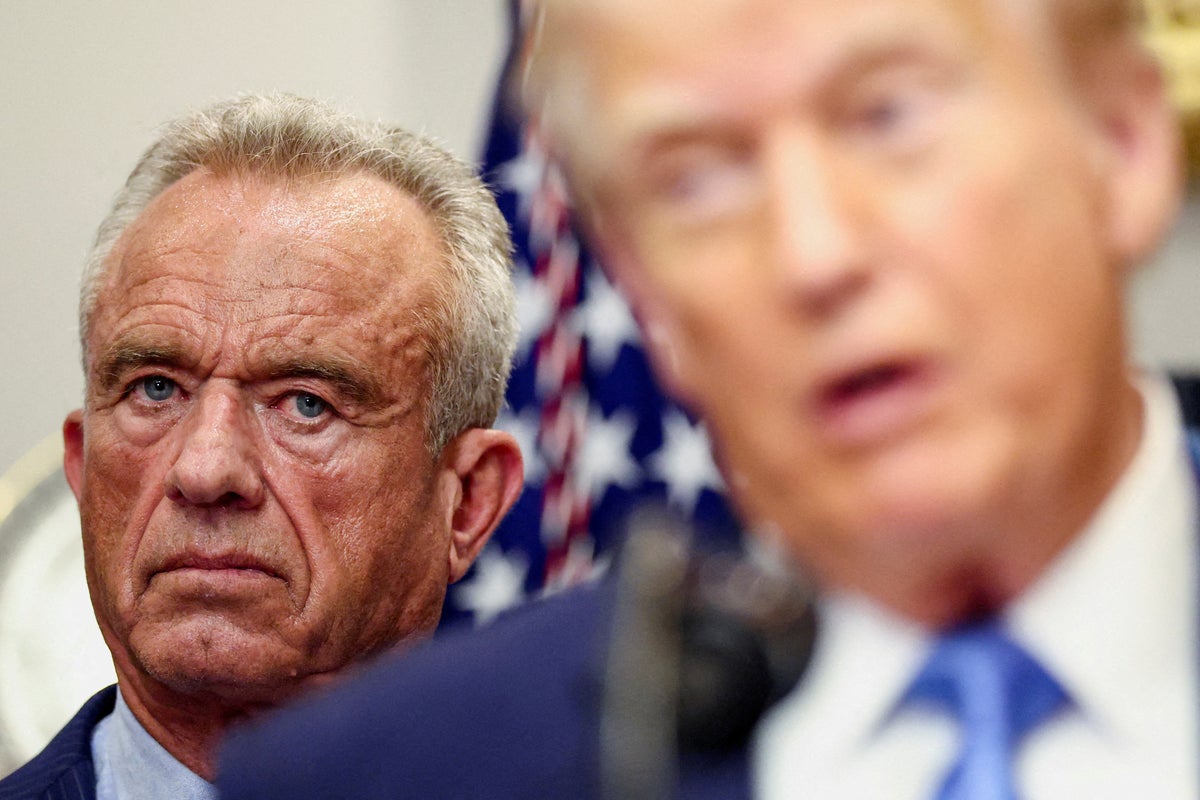
In the weeks leading up to Donald Trump repeatedly telling pregnant Americans “don’t take” Tylenol, administration officials were pushing the president to focus his announcement on a little-known generic drug as a potential therapy for some people with autism.
That all changed after Health Secretary Robert F. Kennedy Jr. met with Tylenol’s CEO.
Kennedy’s meeting with Kirk Perry reportedly convinced Kennedy to push Trump to turn the White House event into a warning against the drugmaker and ubiquitous pain reliever acetaminophen, with the president eager to blame someone or something for rising autism diagnoses — validating a voting bloc of conspiracy theorists and pharmaceutical skeptics who support his “Make America Healthy Again” agenda.
According to The Wall Street Journal, Trump was thrilled at the idea that he could use the event to single out Tylenol, despite guidance from health officials Jay Bhattacharya, Mehmet Oz and Marty Makary who were pushing for the president to mention leucavorin as an emerging treatment for some people with autism.
Trump ultimately did not even name the leucavorin drug during the press conference. He only mentioned in passing that the administration was approving off-label use of an “existing drug” that may help alleviate autism symptoms.
A wide body of research over several decades has determined that acetaminophen is safe but advises expectant mothers to consult with their physicians before use, as is the case with any drug during pregnancy.
Perry, in a hastily scheduled meeting with Kennedy, sought to dissuade the administration from linking the widely used over-the-counter drug to autism.
“As we would with any regulator who reaches out to us, we engaged in a scientific exchange with the Secretary and members of his staff as it relates to the safety of our products,” Tylenol manufacturer Kenvue told The Independent.
In the meeting with Kennedy, Perry and Kenvue’s chief scientific officer Caroline Tillett sought to make the case that there is no clear link between acetaminophen and autism, according to WSJ.
Kenvue executives also argued that there are few safe alternatives to acetaminophen to reduce fevers in pregnant women; untreated fevers during pregnancy can increase the risk for miscarriages and other serious complications, and major medical groups and the Food and Drug Administration have warned that taking alternative pain relievers like ibuprofen and other nonsteroidal anti-inflammatory drugs can heighten a risk of complications.
But on Monday, Trump railed against Tylenol and pushed unproven claims linking its use to autism, while surrounded by health officials from his administration, none of whom intervened to correct the president. “Taking Tylenol is not good,” Trump said. “I’ll say it. It’s not good.”
In a statement shared with The Independent, a spokesperson for Kenvue said “independent, sound science clearly shows that taking acetaminophen does not cause autism.”
“We strongly disagree with any suggestion otherwise and are deeply concerned about the health risks and confusion this poses for expecting mothers and parents,” the spokesperson said.
“The facts are that over a decade of rigorous research, endorsed by leading medical professionals and global health regulators, confirms there is no credible evidence linking acetaminophen to autism,” the spokesperson added. “We stand with the many public health and medical professionals who have reviewed this science and agree.”
Trump and Kennedy, who pledged to find a “cause” for autism by September, had not revealed any new evidence, and existing data does not support their claims, according to researchers and scientists who closely study autism.
Oz broke from the president’s claims this week, admitting that Tylenol is “probably your best option” for fighting lower-grade fevers that don’t require hospitalization.
The FDA’s own statement on autism and Tylenol is also far more cautious: “To be clear, while an association between acetaminophen and autism has been described in many studies, a causal relationship has not been established and there are contrary studies in the scientific literature.”
“It is disingenuous and misleading to boil autism’s causes down to one simple thing,” according to Dr. Alycia Halladay, chief science officer at the Autism Science Foundation.
“We know that autism is incredibly complicated, and we need to move away from studies that simplify it down to one exposure without any other considerations,” she added.
Genetic factors play the “biggest role,” according to the foundation, which says hundreds of genes have been linked to autism, genes that can be inherited or spontaneously change in ways that impact brain development. Other notable factors are “environmental,” such as advanced parental age, prematurity, low birth weight or exposures to fever or illness during pregnancy.
“Autism is not a single condition with a single cause — it is diverse and complex, shaped by genetic, biological, and environmental factors,” the Autism Society of America shared in a statement to The Independent.
“Premature or overstated claims risk retraumatizing families, spreading misinformation, and undermining public health,” the group said.
Autism diagnoses have risen over the last two decades, largely due to an increased awareness and an expanding definition of the condition, according to scientists.
But Kennedy, a conspiracy theorist and vaccine skeptic, has pushed a discredited theory that routine childhood vaccinations are responsible.
A spokesperson for Health and Human Services told WSJ that the agency’s “actions mark historic progress in tackling the autism epidemic — just as Secretary Kennedy promised.”
